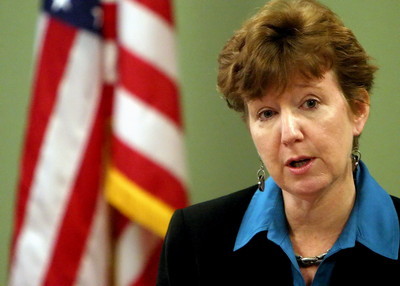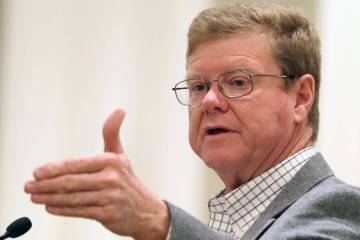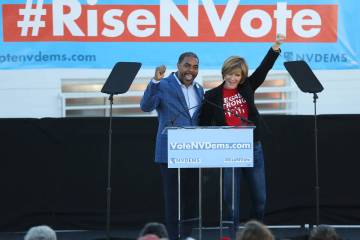Democratic majority falls short of passing budget, finishing work
It was such a nice dream.
The Democrats who lead the Assembly and state Senate were going to do things differently this time. During this legislative session, they said, the budget process was going to be a model of deliberation and openness.
Forget the rushed, haphazard approach of past sessions that so often resulted in Band-Aids for the present rather than long-term strategies for the state's future.
By the end of March, Assembly Speaker Barbara Buckley and state Senate Majority Leader Steven Horsford declared in January, they were going to have a target for how much money the state would need to fund essential services.
By April 17, they would have a revenue plan: a proposal, including new taxes if necessary, for how to fund the government for the next two years. That would leave plenty of time to debate it and pass it on time for the June 1 adjournment.
April 17 was Friday, and the Legislature doesn't appear close to having a plan to deal with a $2.8 billion revenue shortfall that is, in percentage terms, the nation's largest budget gap.
Estimates differ, but the state budget office pegs at $2.8 billion the gap between the amount necessary to maintain current state service levels and the amount likely to come in over the next two years.
Legislative observers say it's business as usual in Carson City. They say the lofty goals formulated before the session have dissolved into the same old haggling over details, putting off the hardest decisions and negotiating over money behind closed doors.
"The Democrats had ambitions (of departing from business as usual), but reality and political pragmatism have outstripped those," said David Damore, political science professor at the University of Nevada, Las Vegas. "We're back where we always are every two years. It's a game of poker that will all come down to some grand bargain at the end."
Gov. Jim Gibbons has been a vocal critic of the way the Legislature has been going about its business.
"It's not fair to the public that these discussions are happening in secret," Gibbons spokesman Daniel Burns said. "We are setting the stage here to spring a series of tax hikes and new taxes on the public on the eve of the end of the session, and the public will have no opportunity to provide input, to say yes or say no or offer ideas. That is inherently unfair and not right."
The governor is widely derided behind the scenes as more or less irrelevant to the legislative process.
Numerous insiders close to the process, chiefly lobbyists who spoke on condition of anonymity because they can't afford to compromise their relationships with legislators, paint more or less the same picture.
They say that, just like in every legislative session, lawmakers do the major horse-trading and agenda-setting behind closed doors.
"They're talking about raising taxes, and they certainly have some ideas about what they're going to do, but they won't say it in public," said one longtime lobbyist. "They're going to end up cobbling something together like they always do at the end of the session."
Buckley and Horsford, both D-Las Vegas, insist their plan is still on track, just a little bit behind.
The important thing is getting the budget right in this time of crisis, however long that takes, Buckley said.
"We are still working methodically on the budget and the potential shortfall we will have," she said. "That ambitious schedule has led to us having a tentative budget earlier than we've ever had it in the state's history. ... We've actually begun closing a lot of budgets based on the spending priority decisions that were made during the first eight weeks."
One-third of agency budgets have been closed in Assembly committees, she said, meaning lawmakers have reached initial agreement on how much to grant.
Earlier this month, legislative leaders from both parties laid out the unforeseen reasons that they can't hit their proposed deadlines.
Chief among them are revenue projections that continue to plummet.
Legislative and executive analysts are guessing another $450 million must be shaved from the baseline of tax receipts for the next biennium.
Lawmakers also cite complicated requirements for the state to get education funding assistance from the federal stimulus bill.
"We've done that process" that was originally proposed, Horsford said. "We spent 10 weeks going through every component of the budget he (Gibbons) submitted to understand what the cuts would mean, which cuts we had to make because of dire circumstances, and those we had to restore because they're not just essential, they're what I call 'mission critical' in terms of the state's ability to provide basic services for its citizens."
In late January, when Democrats announced their agenda, they knew Congress was working on a bill that would provide some relief to cash-strapped state governments. But they didn't know that the final legislation passed in mid-February would require Nevada to either fund education at 2006 levels or get a waiver (with its own arcane rules) to qualify for $324 million in federal money.
Rules for the funding are still being figured out, and legislative analysts have been talking to Education Department officials to determine the best way forward.
Buckley said the latest analysis indicates the state should meet the requirements in the legislation without a waiver, but that's not a final determination.
The education funding uncertainty is a significant wild card.
But lawmakers have been holding hearings, making decisions about what can be cut and what must be kept, and closing budgets one by one, Buckley said. For example, last week lawmakers voted to restore funding to 10 of 12 rural mental health clinics that Gibbons had proposed cutting.
Buckley and Horsford say it has been a bipartisan process, with state Senate Minority Leader Bill Raggio and Assembly Minority Leader Heidi Gansert, both R-Reno, participating in discussions and bipartisan votes on many proposals.
Raggio and Gansert didn't return phone calls seeking comment.
What of the original plan of coming up with a "magic number" to target with funding, then building in enough revenue to provide that funding, using taxes if absolutely necessary?
"That's still the plan," Buckley said. "We've just had to add about three weeks to our timeline."
Gibbons isn't buying it, noting that only six bills have been passed with more than half the 120-day session elapsed.
He accuses lawmakers of wasting the public's time, failing to present alternatives to his proposed cuts, and crafting a secret plan to raise taxes in backroom discussions.
"The governor is disappointed in the pace and the amount of work the Legislature is getting done at a cost to taxpayers of $125,000 a day," Burns said.
"He sent a budget over there on Jan. 15. It was criticized for over 60 days now, yet no one's offering alternate plans. There are people who are putting programs and things back into the budget, but they're not offering ways to pay for them."
Buckley and Horsford deny that there are secret negotiations. Routine closed-door meetings of party caucuses and legislative leaders are nothing untoward, and the real decisions are being made in the open, they say.
"The governor feels very strongly about this," Burns said. "The legislative process should be open. Backroom deals behind closed doors, that's not good government. It's not fair. The citizens of this state deserve more."
Horsford disagreed vigorously with that charge. "Every one of the decisions that we are making are in public through the subcommittee process. Every day we debate the impact of these cuts. I damn near broke down crying (on Thursday) over the cuts to cultural affairs. For those people who are following the process day to day, you can see exactly what's being considered."
Horsford said the original deadlines might have been missed, but this legislative session is far from business as usual.
"We said several weeks ago that we were simply not going to be able to meet that schedule because it's more important to get the budget right and fix the shortfalls the governor proposed than it is to make some arbitrary deadline," Horsford said.
"We believed, and still do, that we could review this budget based on what the governor proposed in January and make the necessary cost-cutting decisions that we need to make."
At the same time, he said, legislators are making decisions about what can't be cut, such as K-12 education.
"I don't think any of us could have expected in January what has happened now," Horsford said. "The fact that we have the worst budget shortfall in America -- 30 percent of the revenue we depended on to balance the budget is gone."
The governor's criticism is hardly fair, Horsford said, considering that Gibbons' own budget doesn't add up.
Based on the new revenue picture and changes Gibbons has made to his proposals, the governor has yet to submit a truly balanced set of budget proposals.
"We have asked for information from the budget office on ways they plan on addressing the holes in his budget, and we are hoping we will get that," Horsford said.
As for whether the funding they decide is necessary is going to require raising taxes, Horsford was blunt.
"Absolutely," he said.
"Just to fund the governor's budget we would have to raise $500 million of new revenue. What I would like to do is have a conversation and provide outreach to those stakeholders in the business community. I think it's time to talk about a broad-based business tax, as difficult as that may be. I don't see how we balance the budget without broadening our revenue base. We need to talk about a lasting solution."
Contact reporter Molly Ball at mball@reviewjournal.com or 702-387-2919.






























